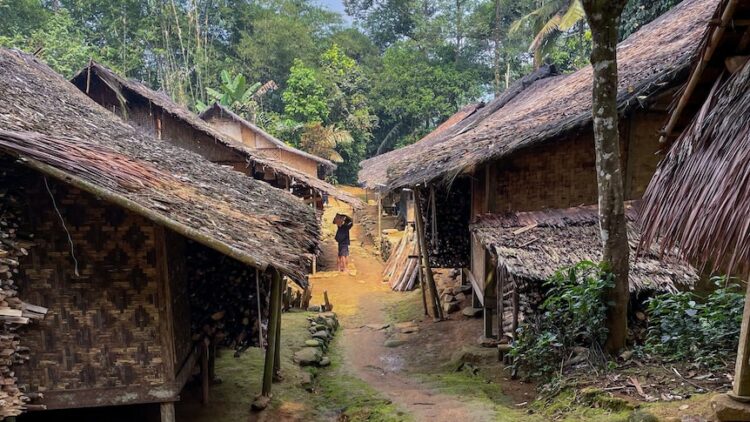By Aaron Miller-
An Indigenous community in Indonesia has requested an internet blackout in their area to minimise the “negative impact” of the online world, officials said Friday.
The Baduy, a community of 26,000 people in Banten province on Java island, divide themselves into an outer group that partly adopts technology, and a sacred inner group that shuns the trappings of contemporary life.
The inner group asked authorities to shut down internet reception or divert nearby telecom towers so the signal would not reach them, according to a letter seen by AFP.
“This request is a part of our efforts to minimise the negative impact of smartphones on our people,” Baduy representatives wrote.
They argued telecommunication towers built near their area could threaten their way of life and the morals of young people who may be tempted to use the internet.
Officials in the district of Lebak told AFP they received the letter on Monday, and had agreed to talk with Indonesia’s information ministry to try and comply with the request.
“Essentially we want to always accommodate what the Baduy people want, and need to maintain their traditions and local wisdom,” Lebak official Budi Santoso told AFP Friday.
He said the internet was needed by the outer Baduy, who have started online businesses, but also that officials were concerned visitors or tourists could access the web and show content they view as inappropriate to Baduy people.
Internet freedom in conservative, Muslim-majority Indonesia is a controversial issue. The government has banned gambling and pornography, and requires internet providers to filter out content they deem inappropriate.
Despite the censorship, illegal websites hosting such content are rampant.
The reclusive inner Baduy — dubbed the Amish of Asia by Western media — have chosen to live in the forest and reject technology, money and traditional schooling.
They reside in three villages across a 4,000-hectare (9,900-acre) area that is several hours’ drive from the capital Jakarta.
The government declared the area a cultural conservation site in 1990.
Indonesia is a vastly diverse country with more than 1,300 ethnic groups spread across the archipelago.
In recent years, the rapid growth of the internet has transformed the way people communicate, access information, and conduct business. However, this unprecedented connectivity has also given rise to a darker side of the online world, with the proliferation of illegal websites that promote illicit activities. Recognizing the need for action, a prominent Indonesian group has recently called for an internet blackout to combat these illegal websites. This article examines the potential impact of such a measure on the Indonesian society, the internet landscape, and the fight against online illegalities.
The Rise of Illegal Websites
The internet has become a breeding ground for various forms of illegal activities, including piracy, fraud, cybercrime, and the dissemination of harmful content. Despite existing regulations and enforcement efforts, many illegal websites continue to operate, posing a significant challenge to authorities and society at large. The call for an internet blackout in Indonesia aims to address this issue by disrupting access to these illicit platforms.
Sources from Indonesia say, one of the main objectives of an internet blackout targeting illegal websites is to disrupt their operations.
One Source anonymously told The Eye Of Media.Com: By temporarily blocking access to these platforms, the Indonesian group hopes to disrupt the revenue streams of these websites and make it more difficult for users to engage in illicit activities. This disruption can act as a deterrent, forcing users to reconsider their actions and potentially reducing the overall demand for illegal content.
Raising Awareness and Promoting Education
”Another crucial impact of the internet blackout initiative is the opportunity to raise awareness and educate the public about the dangers and consequences of accessing illegal websites.
The Indonesian group is using this call to draw attention to the issue and foster a greater understanding of the potential risks associated with such activities. This increased awareness can empower individuals to make more informed choices online and discourage them from engaging with illegal content”.
International Cooperation and Spillover Effects
. The Indonesian group’s call for an internet blackout is seen as a catalyst for global discussions on tackling the issue of illegal websites. By raising awareness of the problem, Indonesia can encourage other nations to take similar measures and collaborate in a coordinated effort to combat online illegalities.
This international cooperation can lead to a more comprehensive and effective approach to addressing the challenges posed by illegal websites.
Evaluating Effectiveness and Long-Term Sustainability
Monitoring the reduction in illegal website activities, assessing changes in public perception and behaviour, and gathering feedback from users and stakeholders are considered to be essential components of this evaluation process. This feedback can help refine the blackout strategy and ensure that it remains an effective tool in the ongoing fight against online illegalities.
The call for an internet blackout by an Indonesian group to combat illegal websites highlights the growing concern over the proliferation of online illegalities.




